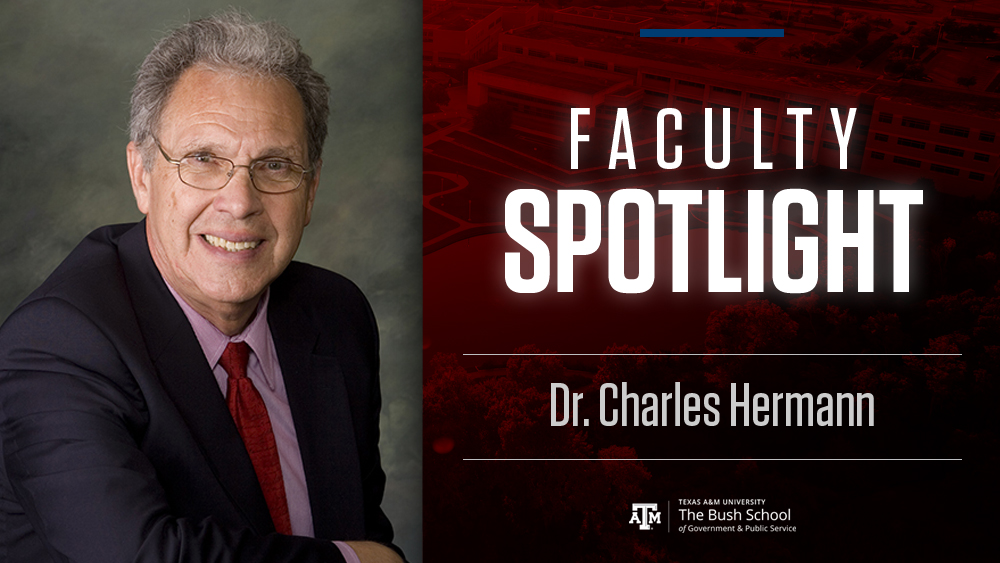
When students step into a class with Dr. Charles Hermann, they are learning from a man who served under Henry Kissinger on the National Security Council and who served as the founding director of the Bush School of Government and Public Service at Texas A&M University. Hermann, professor and Brent Scowcroft Chair in International Policy Studies, has been instrumental in the success of the Bush School since its inception.
“When I came here in 1995, there was no Bush School,” said Hermann. “The University had competed for the Bush Presidential Library and won. Part of the Texas A&M proposal for the Library was that they would create a new graduate school of public administration and co-locate it with the library. My task was to organize the school, which opened two years later in 1997 as a unit within the College of Liberal Arts.”
Hermann was recruited from the Ohio State University, where he had been a professor in political science and served as the director of the Mershon Center for International Security Studies. He also had spent two years as vice provost for international affairs.
“As the director of the Mershon Center and following my experience in Washington, I had become increasingly interested in bringing knowledge to bear on policy problems,” said Hermann. “Here at Texas A&M was a chance to build a school with that kind of focus. To prepare people for careers addressing policy questions was a new challenge for me and was something I was eager to do.”
During a trip to Texas to learn more about the position at the Bush School, Hermann met President Bush for the first time in his Houston office. That interaction was one that would continue during Hermann’s time as founding director of the Bush School, director of the international affairs program, and professor at the Bush School.
“We interacted quite a bit over the first several years,” said Hermann. “He has consistently maintained a very strong interest in the School. He would come and do talks and meet with classes. Right outside our building is a horseshoe pit—a replica of the one he had constructed at the White House—and he would play horse shoes with anyone that took him on. He was good and he played to win.”
President Bush was hardly the first prominent national figure Hermann worked under during his career. While teaching at the Woodrow Wilson School at Princeton, he was offered a Council on Foreign Relations Fellowship to serve on the staff of the National Security Council (NSC) under National Security Advisor Henry Kissinger. While a junior staffer with the National Security Council, Hermann used his knowledge of sub-Saharan Africa—gained as a PhD student at Northwestern—to work as the NSC staff representative on issues related to Africa.
“I worked on African issues, which turned out to be very fortunate,” said Hermann. “Had I been assigned to some area where there was a lot more senior capability, I would have been a gofer getting coffee. But as it was, I often represented the NSC staff on policy problems related to Africa. It was very instructive.”
With a wealth of knowledge gained from his time as a scholar and practitioner in international affairs, Hermann remains an active researcher and teacher in the fields of foreign policy, national security, group decision making, and simulation, and has published widely on each of these topics. In 2012, he edited and contributed to When Things Go Wrong: Foreign Policy Decision Making under Adverse Feedback (his ninth book). In pursuit of his research, he has received a number of grants and contracts from both private and public sources, currently including NSF, Advanced Research Project Agency, the MacArthur Foundation, and Lawrence Livermore National Laboratory. Hermann has also been president of the International Studies Association and has served on the editorial board of several professional journals.
He remains active in his local community, having served as president of the Opera and Performing Arts Society; the Bryan Rotary Club; and, currently, the Brazos Valley Symphony Society Board.
Having been part of the Bush School from its infancy, Hermann is currently working on a book with Sally Dee Wade, the former writing consultant for the Bush School, on the first twenty years of the Bush School in celebration of the twentieth anniversary of the George Bush Library and the Bush School, which will take place in 2017. The book is scheduled to be published next year by Texas A&M University Press.
Possessing an up-close perspective on the School’s first twenty years, Hermann says he thinks the next several years are just as promising.
“Each year, we have a bigger and bigger cadre of graduates in public policy at the local, state, national, and international levels; and that will be even more so in five years,” said Hermann. “[Former CIA officer and senior lecturer] Jim Olson tells this story about giving a talk at the CIA headquarters and asking all the graduates of the Bush School to stand. He says there was an audible gasp when people saw how many there were. In five years, I think there will be a lot more places where people can ask all the graduates of the Bush School to stand; and it will be very impressive.”
